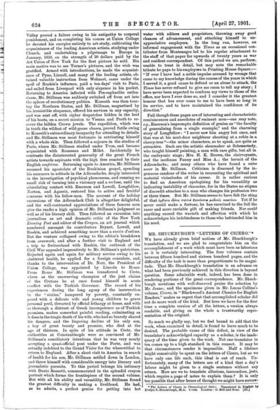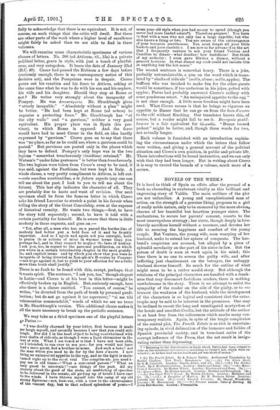MR. SHUCKBURGH'S "LETTERS OF CICERO." WE have already given brief
notices of Mr. Shuckburgh's translation, and we are glad to congratulate him on the accomplishment of a work which must have been as laborious as it is certainly interesting. The four volumes contain between fifteen hundred and sixteen hundred pages, and the difficulty of the task is more than proportionate to its magni. tude. That Mr. Shuckburgh's translation is an advance on what had been previously achieved in this direction is beyond question. Some admirable work, indeed, has been done in rendering portions of the great correspondence. Mr. Shuck- burgh mentions with well-deserved praise the selection by Mr. Jeans; and the specimens given in Mr. Lucas Collins's volume, Cicero, in " Blackwood's Ancient Classics for English Readers," makes us regret that that accomplished scholar did not do more work of the kind. But here we have for the first time a complete version of all the letters, a version always readable, and giving on the whole a trustworthy repre- sentation of the original.
So much we gladly say, but we feel bound to add that the work, when examined in detail, is found to leave much to be desired. The probable cause of this defect, in view of the translator's acknowledged capacity as a scholar, is the inade- quacy of the time given to the work. Not one translator in ten comes up to a high standard in this respect. It may be that circumstances render it impossible. Half a lifetime might conceivably be spent on the letters of Cicero, but as we have only one life each, this ideal is out of reach. Un- fortunately, many of the letters are of a kind that a day's labour might be given to a single sentence without any return. How are we to translate allusions, innuendoes, jests, which require a page of notes to explain them ? It is only too possible that after hours of thought we might have sorrow-
• The Lettere of Cuero in Chronological Order. Translated in English by Evelyn S. Shuckburgh, M.A. 4 vols. London : G. Bell and Sons. [EL]
fully to acknowledge that there is no equivalent. It is not, of course, on such things that the critic will dwell. But there are other parts of the work where a higher level of excellence might fairly be asked than we are able to find in these volumes.
We will examine some characteristic specimens of various classes of letters. No. 306 (ad Atticum, vii., 13a) is a private political letter, grave in style, with just a touch of playful- ness, and very outspoken. It bears the date of January 23rd (B.C. 49). Cresar had passed the Rubicon a few days before (curiously' enough, there is no contemporary notice of this decisive act), and the Pompeians were in despair. Cicero pours out his vexation and his fears to Atticus, asking at the same time what he was to do with his son and his nephew, his wife and his daughter. Should they stop at Rome or not ? He writes very strongly about the incapacity of Pompey. He was ifarparti-prrg. Mr. Shuckburgh gives "utterly incapable." "Absolutely without a plan" might be better. "He bad been kept at Rome (ad urbem) to organise a protecting force." Mr. Sliuckburgh has "at the city walls" and "a garrison," neither a very good equivalent. His proper place was in Spain (his pro- vince), to which Rome is opposed. And the force would have had to meet Ccesar in the field, an idea hardly expressed by "garrison." Cicero goes on to say that there was "no place, as far as he could see, where a garrison could be posted." But garrisons are posted only in the places which they have to defend. Pompey's only hope was in the two legions "somewhat treacherously (inaidiese) retained." Mr. Watson's "under false pretences" is better than treacherously. The two legions were taken from Cmsar's army to be used, it was said, against the Parthians, but were kept in Italy. A whole clause, a very pretty compliment to Atticus, is left out, —acts omnibus n,untiantibus, a te futura expect() (any one can tell me about the past, I look to you to tell me about the future). This last slip indicates the character of all. They are probably due to haste and want of revision. Our next specimen shall be from the famous letter in which. Cicero asks his friend Lucceius to stretch a point in his favour when telling the story of the Great Consulship, even at the expense of historical veracity. He wants two things,—first, to have the story told separately ; second, to have it told with a certain partiality for himself. He is aware that there is little modesty in these requests, and goes on :— "Yet, after all, a man who has onee passed the border-line of modesty had better put a bold face oil it and be frankly impudent. And so I again and again ask you outright, both to praise ill, se actions of mine in warmer terms than you perhaps feel, and in that respect to neglect the laws of history. I ask you, too, in regard to the personal predilection, on which you wrote in a certain introductory chapter in the most gratify- ing and explicit terms and by which you show that you were as incapable of being diverted as Xenophon's EI-rcules by Pleasure —not to go against it, but to yield to your affection for me a little more than truth shall justify."
There is no fault to be found with this, except, perhaps, that it wants spirit. The sentence," I ask you, too," though elegant: in Latin—and Cicero is at his best in this letter—might be effectively broken up in English. Bub, curiously enough, here also there is a clause omitted. "You cannot, of course," he writes, "be diverted from the path of truth by personal predi- lection; but do not go against it (ne aspernere)," "si me tibi vebementius commendabit," words of which we see no trace in Mr. Shuckburgh's version. This additional clause makes it all the more necessary to break up the periodic sentence.
We may take as a third specimen one of the playful letters to Pcetus :—
"I was doubly charmed by your letter, first because it made toe laugh myself, and secondly because I saw that you could still laugh. Nor did I in the least object to being overwhelmed with Your shafts of ridicule, as though I were a light skirmisher in the war of wits. What I am vexed at is that I have not been able, as I intended, to run over to see you: for you would not have bad a mere guest, but a brother-in-arms. And such a hero ! not the man whom you used to do for by the hors d'ouvre. I now bring an unimpaired appetite to the egg, and so the light is main- tained right, up to the roast veal The compliments you used to Pay me in old times—' What a contented person !" What an easy guest to entertain l'—are things of the past. All my anxiety about the good of the state, all meditating of speeches to be delivered in the senate, all getting up of briefs I have cast to the winds. I have thrown myself into the camp of my old enemy Epicurus—not, however, with a view to the extravagance of the Irecent day, but to that refined splendour of yours—I mean your old style when you had moaey to spend .(though you never had more landed estates). Therefore prepare ! You have to deal with a man who not only has a large appetite, but who also knows a thing or two. You are aware of the extravagance of your bourgeois gentilhomme. You must forget all your little baskets and your omelettes. I am now so far advanced in the art that I frequently venture to ask your friend Verrius and Camillus to dinner — what dandies ! how fastidious ! But think of my audacity : I even . gave Hirtius a dinner, without a peacock however. In that dinner my cook could not imitate him in anything but the hot sauce."
The second sentence is somewhat heavy. There is a joke, probably untranslateable, a pun on the word which is trans-
lated by" shafts of ridicule" (minis, abuse; mdfis, apples). The buffoon who was invoked to make fun for the other guests would be sometimes, if too audacious in his jokes, pelted with apples ; Pcetus had probably answered Cicero's raillery with
some ponderous retort. "An unimpaired appetite to the egg" is not clear enough. A little more freedom might have been used. What Cicero means is that he brings so vigorous an appetite ,to *dinner that he can go on from the hors d'ccurre to the roti without flinching. Our translator knows this, of
course, but a reader might fail to see it. Bourgeois yenta- homme is a fair equivalent for 44,o.eaSin. "Dunce turned
pedant" might be better, and, though three words for two, not actually longer.
Each volume is furnished with an introduction explain- ing the circumstances under which the letters that follow were written, and giving a general account of the political situation and Cicero's own position, in public and private life. These introductions will be found instructive, and we can only wish that they had been longer. But in writing about Cicero it is easy to exceed the bounds of a volume, much more of a review.























































 Previous page
Previous page